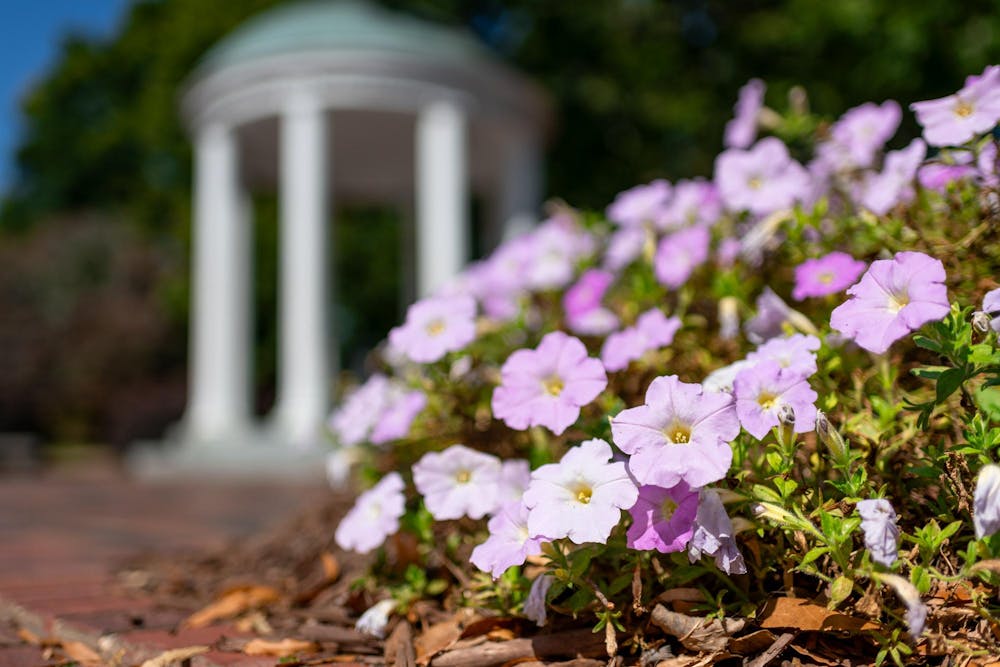Amid responses to the Israel-Hamas conflict on UNC’s campus, the Faculty Council discussed freedom of speech and expression at their meeting on Nov. 3. Following several campus protests and discussions, the council analyzed the role of the University in responding to the conflict.
Faculty also discussed the updated UNC budget, and Chancellor Kevin Guskiewicz spoke on students' use of generative artificial intelligence.
Here’s the rundown.
What’s new?
-
Business professor Mark McNeilly proposed the Resolution on the Rights and Responsibilities of Protesters. Multiple council members proposed amendments, and the resolution's vote was postponed indefinitely due to time restraints.
- McNeilly said the resolution will support the chancellor’s statements against violence and elevate civil discourse and debate. The resolution calls upon University administrators and the Board of Trustees to create educational programs, protect peaceful protesters and ensure the legality of protests.
- “To be clear, this is not a pro-Palestinian resolution. It is not a pro-Israeli statement. This resolution takes no position on the debate about what is happening in the Middle East,” McNeilly said. “This is about what is happening on our campuses and campuses around the country.”
- Business professor Allison Schlobohm and statistics professor Jan Hannig raised concerns about the necessity and the wording of the resolution. Schlobohm and applied physical sciences professor Ronit Freeman moved to amend it.
- The council eventually moved to postpone the resolution and any amendments indefinitely.
-
Mary-Rose Papandrea, a UNC law professor, gave a presentation on college campus protests and expression protected by the First Amendment. She spoke about major court cases in the United States that set standards for freedom and limits of expression on college campuses.
- She also said it is important to remember that since UNC is a public university, it is required to abide by the First Amendment as a state actor.
- “It is essential that the University and any state actor maintain viewpoint neutrality when restricting student protests,” Papandrea said.
-
Christian Lundberg, the chair of the Committee on Academic Freedom and Free Expression, spoke on the committee’s goal of reaching a consensus on campus.
- “The charge of the committee is to define and advise on some norms for free expression and academic freedom and to provide resources that will help empower our faculty and our students to maximize a culture wherein academic freedom and free expression can thrive,” Lundberg said.
- He said the committee is just advisory, meaning it cannot make policy. The committee will be “radically” democratic to ensure consensus among members is reached, Lundberg said.
- Guskiewicz also spoke on the space of free expression at UNC and on generative AI.
- “In the months since our last meeting, our world has been rocked by the war in Israel and Gaza,” he said. “We are concerned about the events these attacks are provoking both locally and globally. As I said in a campus message, we will not stand for acts of violence on our campus.”
- Guskiewicz said the University is committed to allowing groups to express their opinions under the First Amendment and providing resources for impacted communities.
- He also said UNC has chosen to embrace AI on campus. The UNC Generative AI Committee Charter has developed guidelines on the use of AI, Guskiewicz said.
-
Nathan Knuffman, UNC vice chancellor for finance and operations and chief financial officer, provided a budget update on funding, enrollment allocation and endowment.
- He said he is pleased with the state budget, highlighting the seven percent salary increases over the next two years, funding to the North Carolina Collaboratory and the capital investment funds.
-
Dean of the Graduate School Beth Mayer-Davis presented the new strategic planning process titled, “Building on Excellence,” updating the mission and focus.
- Looking ahead, she said the school is working toward a plan to support the mental health of graduate students by creating a committee to determine potential causes in the UNC environment.
- “We need to take a look at these things and we need to really think about, 'How can we adjust how our graduate students are experiencing their education?'” Mayer-Davis said. “Because again, what we want is excellence.”
What's next?
The Faculty Council will meet jointly with the General Faculty on Friday, Dec. 1.




